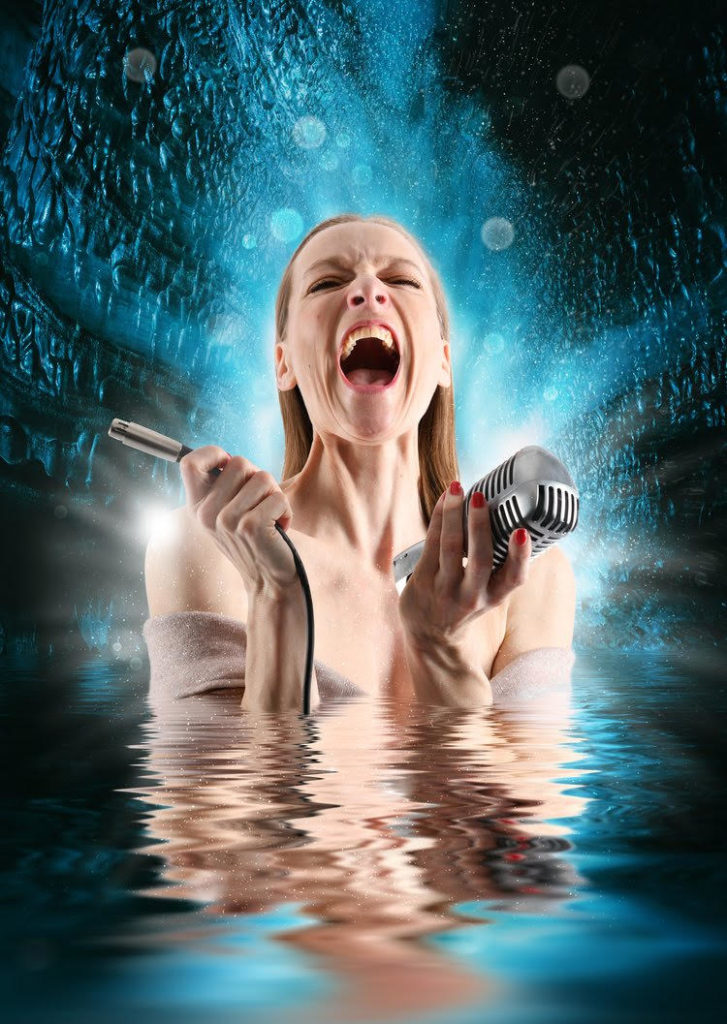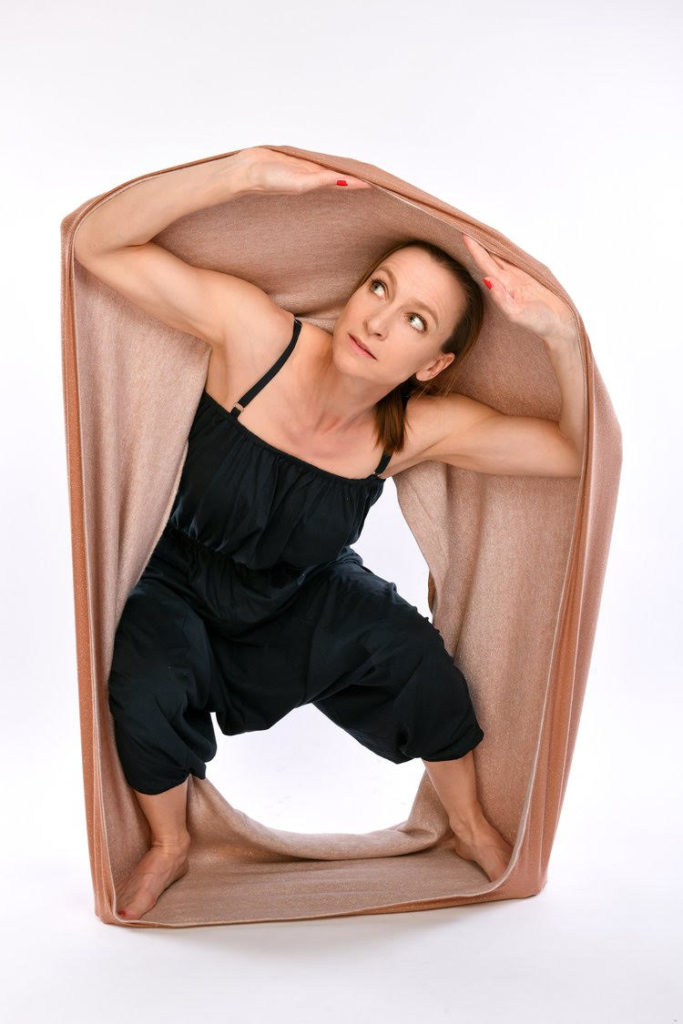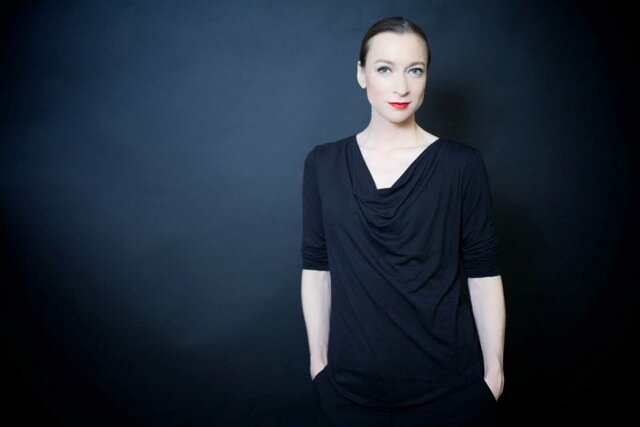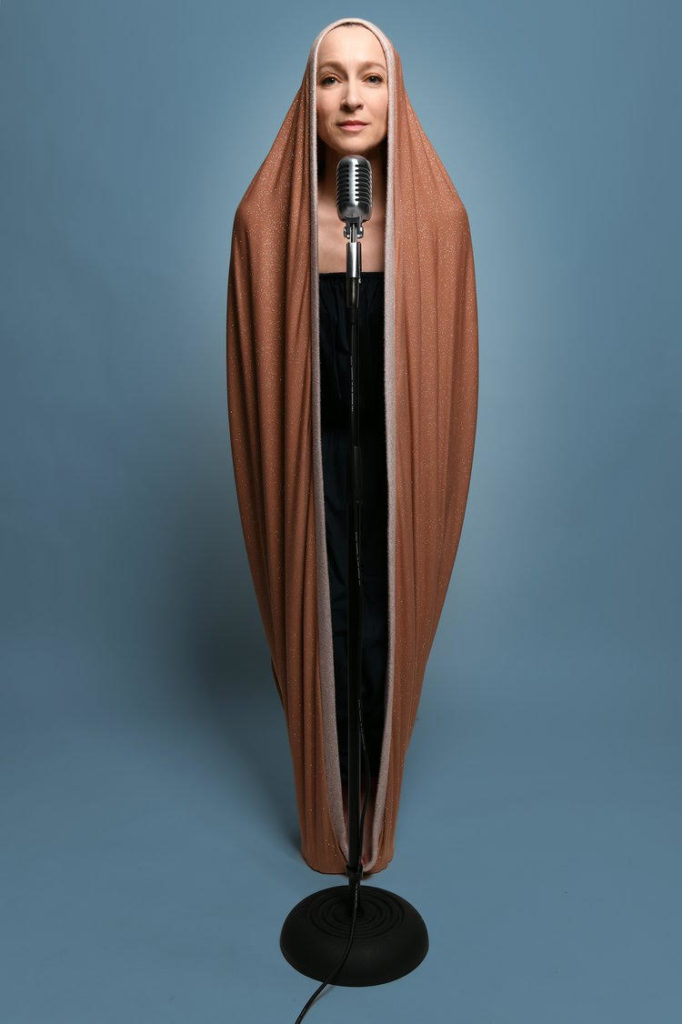
WARNING: Sarah-Louise Young’s show in York tomorrow night, The Silent Treatment, includes themes of trauma and sexual violence.
After her celebrations of Kate Bush (An Evening Without…) and Julie Andrews (Julie Madly Deeply), the Canterbury-born writer-performer returns to Theatre@41, Monkgate, with the highly personal true story of a singer who loses her voice and embarks on an unexpected journey of self-revelation and vocal healing.
In a career as a musical theatre actress, singer, writer, director, Showstopper! improviser and cabaret performer with Fascinating Aida, Sarah-Louise had “always known something wasn’t right with my voice but, like many singers, I assumed it was my fault,” as she revealed to the Guardian in June last year, ahead of the show’s Edinburgh Fringe run. “When a singer loses their voice we question their technique, their lifestyle, even their commitment.”
She had to hide how, every few months, her soprano voice would disappear, inducing a paralysing shame until it returned after few days’ rest. Then, after 11 years of ceaseless performing, “secret collapse and hidden recovery”, she lost her voice on stage mid-performance. “I was mortified,” she told the Guardian.
A consultant discovered cysts, probably there since childhood, he suggested, prompting him to ask Sarah-Louise if anything in her childhood – expressly before she was ten – could have traumatised her voice.
The answer was yes; she was sexually attacked at the age of seven, in daylight. “After the initial distress, I never gave it much thought. But the hand on my mouth, the stifled scream…what the mind forgets, the body remembers,” she wrote in her Guardian piece.
Self-care was advised, coffee became a no-no, work flowed, but after three years, her surgeon deemed an operation was necessary after her cysts burst when performing Julie Madly Deeply through bronchitis for six weeks.
Now there was something else to hide: she would be considered “damaged goods” if it became known she had undergone surgery, or so the “industry gatekeepers” forewarned. Stay silent? No, vowed Sarah-Louise, and nine years on, The Silent Treatment is her story, her voice found anew and her diary busier than ever at 47.

Here Sarah-Louise discusses singing, healing and dealing with what life throws at you with CharlesHutchPress.
What has been the reaction to The Silent Treatment, especially to your revelations about the sexual attack you suffered aged seven?
“The audience and critical response has been overwhelmingly positive. Whenever I make a new show, especially one which is autobiographical, I ask myself the same question: why should anyone care?
“So although the details of the story are personal to me, it connects with many other people’s lived experiences of being silenced, singers and non-singers alike.
“In terms of the sexual attack, my brilliant director Sioned Jones and I spent a lot of time discussing how best to portray it without sensationalising it or traumatising anyone watching.
“Close friends who didn’t know about it were understandably moved or concerned when they watched it but I have made this show from a place of strength and recovery. It is ultimately a very positive story of resilience and healing.”
How do you structure this show?
“Without giving too much away about the piece, I play several different characters, ranging from my suave surgeon to a fruity diaphragm. It’s part quest, part journey into the past. It’s definitely not a conventional linear narrative but you’ll have to come along and see it to find out more.”
Where do songs fit in?
“Music is important and I was lucky enough to work with a fabulous composer called Chris Ash who I knew from Showstopper! The Improvised Musical. He created beautiful soundscapes for the different worlds of the piece, including scenes which take place inside the human body. He even sampled my voice electronically to add to the mix.
“I write the lyrics and we worked together on the songs, which were all created originally for the show to serve different moments. For example, the cysts get their own big solo number, which is great fun.”
An Evening Without Kate Bush and Julie Madly Deeply both had personal elements within them, but this is your most personal show. How does that feel when you perform it?
“I love connecting with an audience and have found with both of those shows that the more generous and open hearted I am, the more the audience will join me. It’s always a privilege to perform for people who have chosen to spend their time with you and the fact that they are invested in my journey is of course very rewarding for me.
“Most importantly, I want them to see themselves reflected back and find a universal meaning within the story.”
Both the Bush and Andrews shows were joyous. What is the tone of The Silent Treatment?
“It’s funny, surreal, intimate and heartfelt, incorporating songs, stories, characterisation, puppetry, movement and mime. There’s a lot going on and while I’m required to give the show a trigger warning due to its sensitive thematic content, I hope I have created a piece of cabaret which is uplifting and entertaining.”
Will there be any audience participation?
“Much less than in my other shows! I chat to the audience as they enter the space and collect tongue-twisters from them. The show is very much performed to them without a fourth wall, but I don’t invite anyone up onto the stage. Well, not yet anyway!”

When did you first find your voice, not the prescribed musical theatre voice?
“I think I found my voice as a child, before I was aware of training. It was free and playful. It took many years later on in life to re-discover that sense of play. I had a fantastic singing teacher, Maureen Scott, who guided me through my surgery and a wonderful vocal therapist called Dr Rehab afterwards.
“Our voices change and develop as we age and making this show has really empowered me to sing with my own authentic voice. I love singing Kate Bush and Julie Andrews’ songs too and enjoy the vocal gymnastics of switching between styles.”
Did you have to re-find your voice after the operation for the cysts?
“I did a month of vocal therapy six times a day. The minimum recovery time from surgery is four weeks and I only had four weeks and a day before opening in Julie Madly Deeply in Toronto, so I had to focus entirely on getting match fit.
“The first time I sang after the operation it was like night and day from singing pre-surgery. My voice has been strong and happy since then and I’ve never looked back.”
Describe a singer’s fear of being treated as damaged goods after an operation…
“At the time I felt vulnerable and also very angry because I knew it wasn’t true. It was someone else’s idea which I had absorbed. Singers get injuries just like athletes and there was no reason for me to feel any different.
“What happens to us is not our shame and I should never have been made to feel embarrassed or that I needed to hide the truth. The Silent Treatment is my response to being told I needed to stay quiet about my experience. I believe it’s a story which needed to be told and I know I’m not alone in this.”
“What the mind forgets, the body remembers,” you say. How have you dealt with that psychologically and physically?
“I’ve been through talking therapy and practice movement as part of my creative process. Our bodies have an incredible higher wisdom and if we listen to them, they will often guide us in the right direction.
“I’ve been mentoring a number of other artists recently and one of the things we explore is readiness to tell your story. Although the rehearsal room can feel therapeutic at times, the performer must be on the right side of therapy before they share that work with a paying audience.
“It must be safe for them and their public to perform the show. If it isn’t, in my opinion, then you might not be ready yet.”
The voice is the most vulnerable, personal, unpredictable instrument, even by comparison with a highly-strung guitar or piano. The only human instrument too.
Why are we not more understanding of its delicate nature for performers, who often pray to “Dr Theatre” to continue performing, as you did for so many years?
“Unless you are fortunate enough to have a laryngoscopy, the voice remains invisible to most people. It is a mysterious instrument and everyone’s voice is unique to them.

“Some singers swear by gargling with cider vinegar, others smoke 20 cigarettes a day and still sing like an angel (although this isn’t a behaviour I endorse for obvious reasons).
“History also has fetishised singers who push themselves to the edge: Judy Garland, Edith Piaf, Amy Winehouse, for example. How can these incredible voices come from such damaged people?
“We love watching people on the edge, on a tightrope, and when they fall, we make them martyrs for their art.
“It’s getting better for performers now, partly thanks to high-profile artists like Adele going public with their vocal challenges and partly, I think, because in general we’re waking up to the importance of looking after our mental health.
“Our voices and our well-being are intrinsically linked, and I hope for the next generation of performers there will be more compassion and understanding moving forward.
“I was chatting to the principal of an Australian musical theatre course recently and he told me they get all their students scoped in the first term, so not only do they see and understand their voices, but they also have a visual record for the rest of their careers to refer back to if they run into any difficulties.
“Had that been available to me all those years ago, I might have discovered my issue decades earlier.”
Did your voice change after the cysts were removed?
“The tone and sound was the same, but it was much stronger and I don’t have any breathiness any more, even when I’m tired.”
How does your voice behave now?
“It’s a joy to sing and I have no concerns whatsoever.”
How do you take care of your voice on tour, at the Fringe etc?
“Out of habit from so many years of looking after myself, I tend not to drink alcohol when I’m working but that is as much about mental clarity as vocal care. I used to have acid reflux but I don’t any more, so I mainly focus on getting good sleep, staying hydrated and warming down after a show as well as warming up.”
Are you off to the Edinburgh Fringe this summer?
“I’ll be there for the first week to bed-in two shows I’ve directed: Gertrude Lawrence – A Lovely Way To Spend An Evening, with Lucy Stevens, and Kravitz, Cohen, Bernstein And Me with Deb Filler. I’ll also be running a drop-in for solo performers on August 7, offering solidarity and support to artists on their own.”
Sarah-Louise Young in The Silent Treatment, Theatre@41, Monkgate, tomorrow (16/7/2023), 7pm. Box office: tickets.41monkgate.co.uk.
